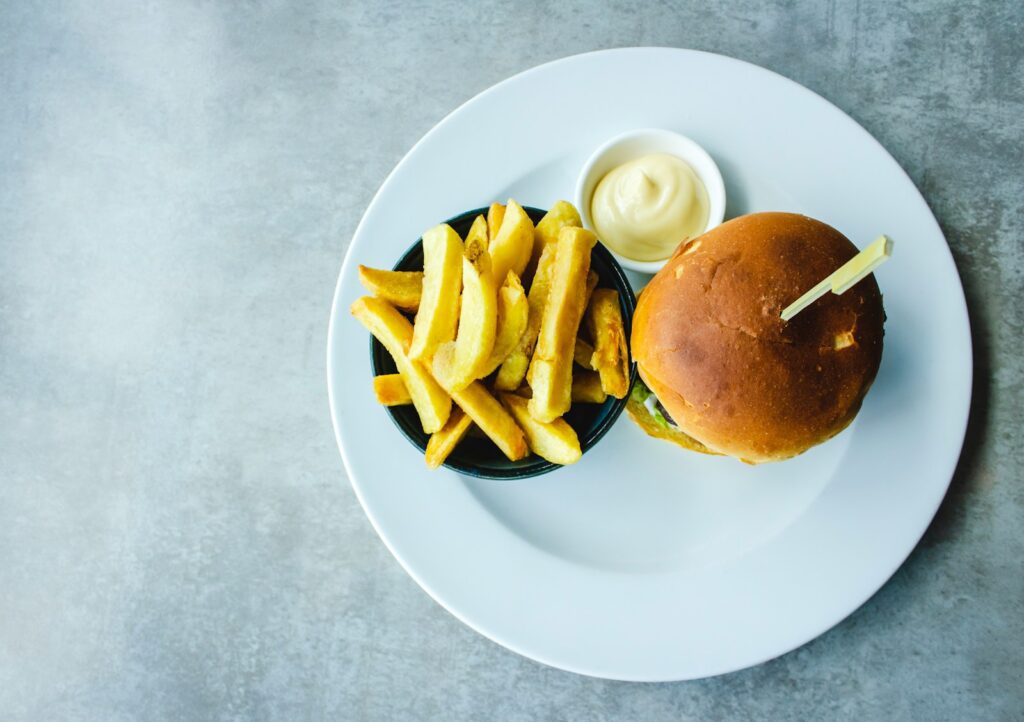Are you struggling with weight loss, low energy, or nagging health issues? If so, chances are your diet could be contributing to the problem. What we eat profoundly impacts our overall well-being. While there are many ‘healthy’ foods, there are also several culprits that sabotage our health goals.
Small but meaningful dietary changes can significantly improve energy levels, weight management, and chronic disease risk. Instead of overwhelming yourself with a complete dietary overhaul, let’s start with eliminating the top 3 worst offenders for the biggest and fastest impact.
1. Sugary Drinks

When it comes to damaging your health, sugary drinks like sodas, sports drinks, and sweetened juices stand out. These beverages offer nothing but a flood of empty calories, often in a single serving.
Why they’re harmful:
- Weight gain and obesity: The calories in sugary drinks rapidly add up, contributing to weight problems and even obesity.
- Diabetes risk: Habitual consumption of sugary drinks disrupts blood sugar balance and significantly increases the chances of developing type 2 diabetes.
- Heart disease: Studies link sugary drinks to an increased risk of cardiovascular disease.
Alternatives:
The best way to quench your thirst and optimize your health is with plain water. If you’re feeling a little fancy, try:
- Unsweetened tea: Enjoy hot or iced varieties rich in beneficial antioxidants.
- Sparkling water with fruit: Make a refreshing and healthy alternative to soda by adding slices of your favorite fruits to sparkling water.
2. Ultra-Processed Foods

Ultra-processed foods are essentially food products that have been extensively altered from their natural state. These items, like packaged snacks, sugary cereals, frozen meals, and refined grains (such as white bread and pasta), dominate supermarket shelves.
Why they’re harmful:
- High in unhealthy ingredients: Ultra-processed foods burst with excessive sodium, unhealthy fats, refined sugars, and artificial ingredients.
- Low in nutrients: They’re stripped of vitamins, minerals, and fiber that our bodies desperately need.
- Chronic disease: Ultra-processed foods are associated with an increased risk of several chronic diseases, including heart disease, diabetes, and obesity.
Alternatives:
Focus on incorporating more:
- Whole foods: Think fruits, vegetables, legumes, and whole grains.
- Minimally processed options: Examples include pre-cut vegetables, plain yogurt, and frozen fruit without added sugar.
3. Fried Foods

While the occasional indulgence in fried foods like french fries, fried chicken, or doughnuts might seem harmless, they regularly pack a serious punch to your health.
Why they’re harmful:
- High in calories: Fried foods are very calorie-dense, meaning they offer many calories in a small portion, pushing you toward weight gain.
- Unhealthy fats: Fried foods are often cooked in unhealthy oils, raising levels of ‘bad’ cholesterol and increasing the risk of heart disease.
- Other health risks: Eating a lot of fried foods puts you at higher risk for stroke and type 2 diabetes.
Alternatives:
Switch to healthier cooking methods like:
- Baking: Chicken, fish, and even ‘fries’ turn out delicious and crispy in the oven.
- Grilling: Ideal for burgers, veggies, and more!
- Air-frying: Great for a crispy outer layer with minimal added fat.
While eliminating sugary drinks, ultra-processed foods, and fried foods forms a powerful foundation for better health, let’s dive into some other critical areas worth addressing.
The Power of Gradual Change
Quitting unhealthy foods cold turkey can be challenging and often unsustainable. Don’t feel pressured to make drastic changes overnight. The most successful dietary transformations take place with gradual adaptation.
Start by reducing your consumption of the top 3 offenders. Swap a soda for water a few times a week. Gradually switch white bread for whole-grain varieties. Experiment with baked or grilled dishes instead of frying. Focus on progress, not perfection.
Reading Food Labels
It’s astonishing how hidden sugars, unhealthy fats, and excessive sodium lurk in many processed foods. Don’t be misled by flashy advertising and “health halos.” Instead, become a savvy food detective. Here’s what to look out for:
- Serving Size: Beware deceptively small serving sizes leading you to underestimate your intake.
- Added sugars: Watch out for sneaky names like dextrose, high fructose corn syrup, and dozens of others.
- Fat: Avoid trans fats at all costs and aim for healthier unsaturated fats in moderation.
- Sodium: Check the recommended daily value percentage to find smarter choices.
Tips for Success
Making dietary changes takes planning and perseverance, but there are many strategies to ensure you succeed:
- Meal planning: Set aside some time each week to plan healthy meals and snacks, reducing spur-of-the-moment unhealthy choices.
- Healthy snacks on hand: Stock up on fruits, vegetables, nuts, and yogurt to ward off cravings for unhealthy processed snacks.
- Finding support: Enlist friends, family, or consider joining a healthy eating support group for encouragement and accountability.
Nutritional No-Nos: Foods to Reconsider
- Sugary Drinks – High in empty calories and contribute to obesity and diabetes. – Maria, Brazil
- Processed Meats – Linked to increased risk of cancers and heart diseases. – Johan, Sweden
- White Bread – High glycemic index, can lead to spikes in blood sugar. – Chen, China
- Deep-Fried Foods – High in trans fats, leading to heart problems. – Amina, Egypt
- Margarine – Contains unhealthy trans fats, bad for cholesterol levels. – Lucas, Canada
- Instant Noodles – High in sodium and preservatives, low nutritional value. – Min-ji, South Korea
- Candy Bars – High in sugar and fats, contribute to weight gain. – Olivia, United States
- Soda – Excess sugar contributes to obesity and tooth decay. – Diego, Mexico
- Fast Food Burgers – High in saturated fats and calories, poor nutritional quality. – Ahmed, Saudi Arabia
- Packaged Snacks – Often contain high levels of sodium and preservatives. – Sara, Netherlands
- Ice Cream – High in sugar and fat, contributing to obesity. – Anna, Russia
- Potato Chips – High in calories and fats, linked to weight gain. – Luke, Australia
- Refined Cereals – Low in fiber and nutrients, often high in sugar. – Kemi, Nigeria
- Energy Drinks – High in caffeine and sugar, can lead to health issues. – Yumi, Japan
- Pre-packaged Meals – Often high in sodium and additives, low in nutrients. – Emil, Denmark
- Alcohol – High calorie, can lead to liver disease and addiction. – Fiona, Ireland
- White Pasta – High glycemic index, contributes to sugar spikes. – Giorgio, Italy
- Butter Popcorn – High in saturated fats and sodium. – Claire, France
- Sweetened Yogurt – High in sugar, often low in real fruit content. – Anika, India
- Baked Goods – High in sugar, fats, and often contain trans fats. – Nora, Norway
- Canned Soup – High in sodium, can contribute to high blood pressure. – Miguel, Spain
- Dairy Ice Cream – High in saturated fat and sugar, contributing to heart disease. – Tanya, Ukraine
- BBQ Sauce – High in sugar and sodium, can contribute to weight gain. – Jake, New Zealand
- French Fries – High in trans fats and sodium, linked to heart disease. – Fatima, Morocco
- Fruit Juices – Often contain as much sugar as sodas, low in fiber. – Leo, Argentina
- White Rice – High glycemic index, can lead to increased risk of diabetes. – Priya, Malaysia
- Cream Cheese – High in fat, contributes to high cholesterol. – Elin, Sweden
- Flavored Coffee Drinks – High in sugar and calories. – Isabella, Italy
- Microwave Popcorn – Contains harmful chemicals in the lining of the bags. – Hamish, Scotland
- Processed Cheese – High in sodium and preservatives. – Lara, Croatia
- Cereal Bars – Often marketed as healthy but high in sugar and syrups. – Paulo, Brazil
- Store-Bought Smoothies – Can be high in sugar and calories, deceivingly unhealthy. – Nia, Ghana
- Diet Soda – Artificial sweeteners may have negative health effects. – Simon, Germany
- Frozen Pizza – High in sodium, fats, and additives. – Sofia, Greece
- Ketchup – High in sugar and sodium. – Alex, Canada
- White Sugar – Contributes to obesity and diabetes. – Hana, South Korea
- Artificial Sweeteners – Can lead to craving more sweets, weight gain. – Omer, Turkey
- Vegetable Oils – High in omega-6 fatty acids, can lead to inflammation. – Petra, Czech Republic
- Low-Fat Products – Often replace fats with sugars or artificial ingredients. – Carlos, Portugal
- Biscuits – High in sugar and trans fats. – Lina, Lithuania
- Sausages – High in fat and sodium, often contain preservatives. – Igor, Poland
- Condensed Milk – Very high in sugar. – Sasha, Russia
- Instant Coffee – High in additives, lower in antioxidants. – Jamie, United Kingdom
- Milk Chocolate – High in sugar and fat, low in cocoa benefits. – Tariq, Jordan
- Bagels – High in calories and carbohydrates, often lead to energy crashes. – Leah, Israel
- Sports Drinks – High in sugar, unnecessary for most people’s workouts. – Finn, Ireland
- Granola – Often high in sugars and oils, marketed as healthy. – Zoe, New Zealand
- Processed Salad Dressings – High in unhealthy fats and sugars. – Elena, Bulgaria
- Fried Chicken – High in trans fats and calories. – Kwame, Kenya
- Pancakes with Syrup – High in refined carbs and high-fructose corn syrup. – Dmitri, Ukraine
FAQs
What if I crave these foods?
Cravings are a natural part of changing old habits. Be prepared by arming yourself with healthy alternatives or swaps. If you indulge, get back on track with your next meal or snack. Remember, you don’t have to abandon your favorite flavors; instead, discover healthier ways to enjoy them.
Are there exceptions?
A healthy lifestyle embraces the concept of ‘everything in moderation.’ Allowing yourself the occasional treat, such as a small portion of fries or a piece of cake, maintains both physical and mental wellbeing. Ensure that these are truly indulgences and not part of your everyday routine.
How long will it take to see results?
Remember that meaningful health improvements involve a consistent, sustained approach. You may feel better within days or weeks of switching out the top dietary offenders. For conditions like weight loss and health markers, steady and healthy change over time offers the most success.
Conclusion
Choosing to eliminate these 3 worst offenders—sugary drinks, ultra-processed foods, and fried foods—delivers extraordinary value and health benefits for the effort. By consistently choosing whole, nutrient-rich alternatives, you are setting yourself up for success. Think of this not as deprivation but as nourishing your body for improved energy, health, and lasting vitality.
This transformation empowers you to take active control of your own well-being. While there are countless additional healthy eating considerations, these changes create a firm foundation for further success.
Embracing this journey fosters a healthier relationship with food. Your cravings for unhealthy options will naturally ease as you begin to experience the benefits of fueling your body with real, nourishing fare.
Small dietary steps today lead to life-changing impacts over time. Don’t wait until you ‘feel ready’ to take the first step; begin incorporating these changes at your next meal.
Be kind to yourself during this process. Habits that developed over time won’t disappear overnight. Instead, celebrate every positive choice, acknowledge setbacks as learning opportunities, and know that each healthy decision moves you closer to optimal health.
Moving Forward: Additional Information and Support
Taking complete control of your dietary habits can be a complex process. If you want to go even further with achieving your health goals, consider these valuable options:
- Consulting a registered dietician: For a personalized nutritional plan tailored to your unique needs and addressing any health concerns.
- Explore reputable healthy eating resources: Find healthy recipes, articles, and meal planning support through trusted websites and organizations.
- Join health and wellness communities: Share your journey and find inspiration from others focused on achieving better health.
Remember, every healthy choice counts! Your future self will thank you for starting today.

